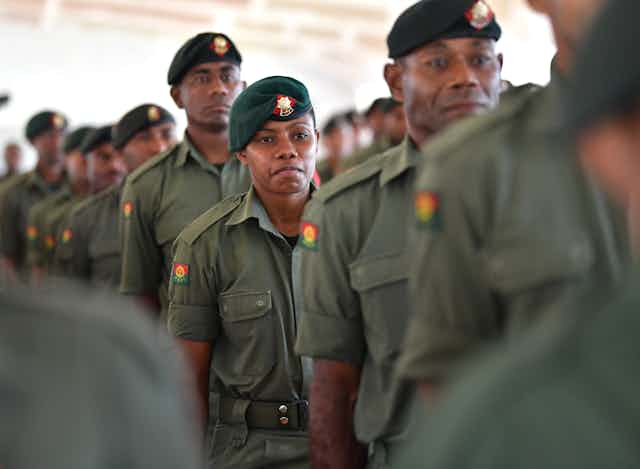Fiji has a track record of service to the British crown. Travel to Hereford, where the Special Air Service is based, and you will find a statue of Sergeant Talaiasi Labalaba, who was one of the 212 Fijians who joined the British Army in 1961 and gave his all in the 1972 Battle of Mirbat in Oman.
When you arrive at Nadi International Airport in Fiji, there is another statue honouring his sacrifice.
Opposition defence spokesperson Andrew Hastie’s call for foreigners, including from the Pacific, to enlist in the Australian Defence Force (ADF), is therefore neither new, nor necessarily unwelcome, in parts of the Pacific.
If Australia wanted to recruit Fijians into the ADF tomorrow, it would have no problem raising a battalion in one day.
Fiji has what is called a “youth bulge”, which occurs when a country’s youth population is particularly large compared with other age ranges. Unemployment is a challenge, and recruits might see enlisting in the ADF as one of their few routes to economic opportunity – and eventual Australian citizenship.
The challenge will be finding the ideal recruits that meet the standards for the required roles needed for the ADF. Therefore, strict criteria for entry should be considered, given there will be no shortage of volunteers.
Why I chose to join the British Army
Since 1998, thousands of young Fijian men and women have travelled to the United Kingdom to fill in the gaps of the British armed forces. I was one of them. I served in the 1st Battalion Duke of Wellington’s Regiment (now Royal Yorkshire Regiment) with multiple tours to Iraq.
No one joins the British Army with the hope of going to war. The September 11 attacks changed everything and new theatres opened up in Afghanistan and Iraq. Fijian men and women served in these wars, and some paid with their lives. There is nothing unique about this. It is the cost for taking the queen’s shilling. Fijians in the British Army understand they are not special, and should not be given any special treatment because of where they have travelled from.
When I joined the British Army in 2001, I was 19 attending the University of the South Pacific with a full scholarship, studying chemistry. I made a calculated decision to join given what was going on in the country at the time. The 2000 coup had recently taken place and I was concerned for my future. Like any young person, the opportunity to travel and see the world through the army appealed.
Observers may question whether recruiting Fijians or other Pacific citizens constitutes exploitation. But Fijians who join the British Army do not feel exploited; they see it as an honourable duty that comes with economic benefits to improve their own welfare and those of their families. There have been hundreds of Fijian soldiers completing their 22 years of service in the British Army from last year. They are entitled to retire with a full pension after this length of service.
Australia should consider targeting these Fijians first if they are serious about recruitment and wish to test the idea.
If not, consider recruiting those who are still serving with the British Army. Fijians would prefer to be closer to home with the same economic value they get out of the UK forces. They would have already been vetted from a security standpoint, too.

Developing trust in the Pacific
Recruitment from the Pacific Islands should also be considered a smart security strategy for Australia. This kind of policy change goes beyond any memorandum of understanding or government security agreement.
In Fiji, households that have sent their sons and daughters to serve in the British armed forces develop a close connection with the United Kingdom. Fijian servicemen and women are remembered in the prayers in the households of these families.
Australia has already developed this kind of trust by helping Fiji during natural disasters. Former Prime Minister Frank Bainimarama’s government softened its tone with Canberra after Australia provided critical support in the aftermath Cyclone Winston in 2016. The sight of HMAS Canberra arriving in Fiji was a welcome one.

Australian tourists have also been coming to Fiji for decades contributing to Fiji’s economic growth, so the close relationship with Fiji is already there. And then there is our nations’ shared love of rugby.
The currency of meaningful relationships is valued in the Pacific Islands region. Get this right, and you have trust.
If I had the opportunity to join the Australian Army back in 2001, I would have been outside a recruitment centre in record time. An opportunity is presenting itself here which will simultaneously be a step towards fulfilling Australia’s security needs, while also helping Fiji.

